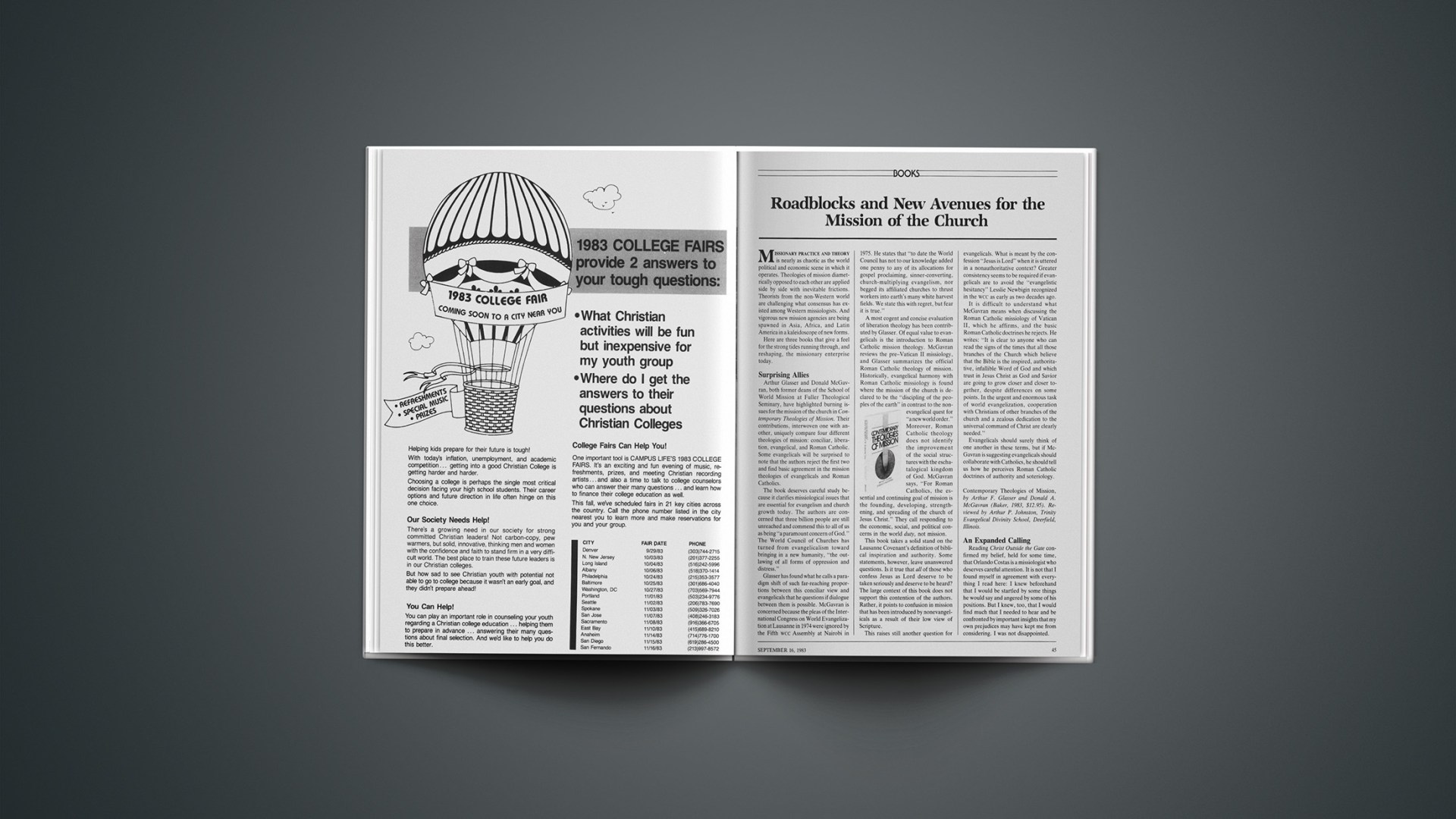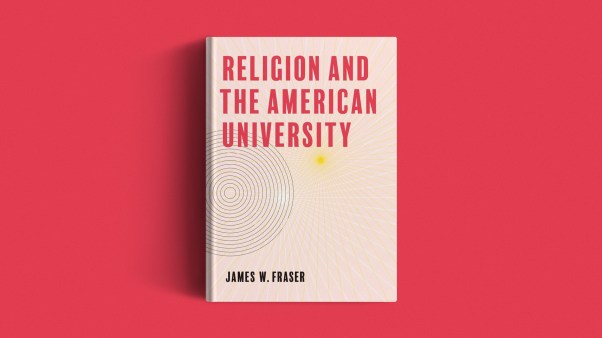Roadblocks And New Avenues For The Mission Of The Church
Missionary practice and theory is nearly as chaotic as the world political and economic scene in which it operates. Theologies of mission diametrically opposed to each other are applied side by side with inevitable frictions. Theorists from the non-Western world are challenging what consensus has existed among Western missiologists. And vigorous new mission agencies are being spawned in Asia, Africa, and Latin America in a kaleidoscope of new forms.
Here are three books that give a feel for the strong tides running through, and reshaping, the missionary enterprise today.
Surprising Allies
Arthur Glasser and Donald McGavran, both former deans of the School of World Mission at Fuller Theological Seminary, have highlighted burning issues for the mission of the church in Contemporary Theologies of Mission. Their contributions, interwoven one with another, uniquely compare four different theologies of mission: conciliar, liberation, evangelical, and Roman Catholic. Some evangelicals will be surprised to note that the authors reject the first two and find basic agreement in the mission theologies of evangelicals and Roman Catholics.
The book deserves careful study because it clarifies missiological issues that are essential for evangelism and church growth today. The authors are concerned that three billion people are still unreached and commend this to all of us as being “a paramount concern of God.” The World Council of Churches has turned from evangelicalism toward bringing in a new humanity, “the outlawing of all forms of oppression and distress.”
Glasser has found what he calls a paradigm shift of such far-reaching proportions between this conciliar view and evangelicals that he questions if dialogue between them is possible. McGavran is concerned because the pleas of the International Congress on World Evangelization at Lausanne in 1974 were ignored by the Fifth WCC Assembly at Nairobi in 1975. He states that “to date the World Council has not to our knowledge added one penny to any of its allocations for gospel proclaiming, sinner-converting, church-multiplying evangelism, nor begged its affiliated churches to thrust workers into earth’s many white harvest fields. We state this with regret, but fear it is true.”
A most cogent and concise evaluation of liberation theology has been contributed by Glasser. Of equal value to evangelicals is the introduction to Roman Catholic mission theology. McGavran reviews the pre-Vatican II missiology, and Glasser summarizes the official Roman Catholic theology of mission. Historically, evangelical harmony with Roman Catholic missiology is found where the mission of the church is declared to be the “discipling of the peoples of the earth” in contrast to the nonevangelical quest for “a new world order.” Moreover, Roman Catholic theology does not identify the improvement of the social structures with the eschatalogical kingdom of God. McGavran says, “For Roman Catholics, the essential and continuing goal of mission is the founding, developing, strengthening, and spreading of the church of Jesus Christ.” They call responding to the economic, social, and political concerns in the world duty, not mission.
This book takes a solid stand on the Lausanne Covenant’s definition of biblical inspiration and authority. Some statements, however, leave unanswered questions. Is it true that all of those who confess Jesus as Lord deserve to be taken seriously and deserve to be heard? The large context of this book does not support this contention of the authors. Rather, it points to confusion in mission that has been introduced by nonevangelicals as a result of their low view of Scripture.
This raises still another question for evangelicals. What is meant by the confession “Jesus is Lord” when it is uttered in a nonauthoritative context? Greater consistency seems to be required if evangelicals are to avoid the “evangelistic hesitancy” Lesslie Newbigin recognized in the WCC as early as two decades ago.
It is difficult to understand what McGavran means when discussing the Roman Catholic missiology of Vatican II, which he affirms, and the basic Roman Catholic doctrines he rejects. He writes: “It is clear to anyone who can read the signs of the times that all those branches of the Church which believe that the Bible is the inspired, authoritative, infallible Word of God and which trust in Jesus Christ as God and Savior are going to grow closer and closer together, despite differences on some points. In the urgent and enormous task of world evangelization, cooperation with Christians of other branches of the church and a zealous dedication to the universal command of Christ are clearly needed.”
Evangelicals should surely think of one another in these terms, but if McGavran is suggesting evangelicals should collaborate with Catholics, he should tell us how he perceives Roman Catholic doctrines of authority and soteriology.
Contemporary Theologies of Mission, by Arthur F. Glasser and Donald A. McGavran (Baker, 1983, $12.95). Reviewed by Arthur P. Johnston, Trinity Evangelical Divinity School, Deerfield, Illinois.
An Expanded Calling
Reading Christ Outside the Gate confirmed my belief, held for some time, that Orlando Costas is a missiologist who deserves careful attention. It is not that I found myself in agreement with everything I read here: I knew beforehand that I would be startled by some things he would say and angered by some of his positions. But I knew, too, that I would find much that I needed to hear and be confronted by important insights that my own prejudices may have kept me from considering. I was not disappointed.
I urge evangelical leaders not to ignore this book, even though they may take strong exception to parts of it.
Certainly Costas’s evaluation of liberation theologies ought to be carefully considered by anyone who ventures to comment on this movement. Here, as elsewhere, the reader will find the author determined to be faithful to the Scriptures. Consequently, he does not hesitate to raise basic questions that he has with liberation thinking, and he effectively refutes some of the liberation theologians’ basic tenets.
In his discussion of “Christian Mission in the Americas,” Costas issues a call to deeper thinking about the character of God’s mission in a Third World situation. He sees the kingdom of God as the frame of reference for all such thinking and boldly deals with what it means to proclaim the kingdom and face its demands and priorities.
If he is right in his teaching here, many evangelical missions may have to expand greatly their understanding of their calling. If he is wrong, this needs to be demonstrated by arguments that combine—as his do—a strong emphasis on Scripture and a passionate sensitivity to the plight of great multitudes in the Third World.
The author very forthrightly states how he feels North Americans ought to respond to the cry of Latin America. My personal reaction to this chapter is that—while it contains much that ought to prompt us soberly to reflect and repent for what we have done, and are doing, in Latin America—Costas so overstates some points that he may unnecessarily lose a hearing among those he would most want to influence constructively. Some generalizations would carry much greater impact were they not stated in such unqualified fashion. We ought not ask to be spared strict accountability for our failures, but we may call for a more balanced evaluation of the imperfect efforts of several generations of North American missionaries—especially when their motives are being called into question.
At the same time, he validly insists that evangelicals (and particularly North American evangelicals) dare not casually write off loud cries from the world’s oppressed peoples. And he will not allow us to continue to overlook the glaring inadequacies he perceives in our North American understanding of the gospel. We owe him a vote of thanks for helping us come to grips with the incompleteness of some cherished viewpoints.
While Costas is especially concerned to better our understanding of the Scriptures as they bear on the Latin American situation, his burden extends to the work of Christ throughout the world. He touches on a wide range of contemporary issues in mission and brings to them a biblical perspective, combined with the contextual insights of a widely read, deeply committed Third World theologian and missiologist.
Christ Outside the Gate: Mission Beyond Christendom, by Orlando E. Costas (Orbis, 198 pp., $12.95). Reviewed by Horace L. Fenton, Jr., consultant on mission. First Presbyterian Church, Bethlehem, Pennsylvania.
A Dynamic Dawning
The “last age of missions” into which we are rapidly moving is, according to Lawrence Keyes, the era in which the Third World joins the Western world as a major locus of intensive and increasing missionary-sending activity. Whether or not this is indeed the last age of missions (God may have some plans we are not aware of), the rapidly growing cross-cultural missionary activities of non-Western churches must be one of the most significant world evangelization developments in our time.
Lawrence Keyes, newly appointed president of Overseas Crusades, and research and information coordinator of the World Evangelical Fellowship’s Missions Commission, carefully documents this gratifying rapid growth of non-Western missionary activity in Africa, Asia, Latin America, and Oceania. His is the third major research focusing on this worldwide phenomenon in the last 10 years. The James Wong, Edward Pentecost, and Peter Larson 1972 survey, Missions from the Third World, first focused attention on the significant rise of Third World missions. In 1976, Marlin Nelson produced refined data regarding Asian missions. In The Last Age of Missions, Keyes now moves the research forward by again surveying indigenous missions in all the Third World, attempting to discover some of the dynamics undergirding this new missions thrust, and seeking also to discover how Western missions might encourage and cooperate with these emerging missions in meaningful patterns of partnership.
Keyes first quickly traces the expansion of missionary-sending activity from that of the early church in the Middle East, to that emanating from Europe during the Middle Ages and up to the present, to that of North American Christians during the last two centuries, and finally moving full circle to the new missions activities of Third World Christians. He shows how, missions have moved from paternalism to partnership. He also tells why he feels that the emerging missions are more likely to be successful in contextualizing their missionary methods and message than Western missions have been.
In the heart of the book, Keyes reports the significant findings of his survey. The tables comparing the 1980 data with that of 1972 are particularly enlightening. The 1972 study reported 203 non-Western mission agencies, while Keyes reports 368 active agencies in 1980. In 1972, the estimated number of Third World missionaries was 3,404. In 1980, the conservative estimate was 13,000.
The last 75 pages of the book form a useful “Third World Missionary Agency Directory,” giving accurate, and up-to-date information about the 368 active agencies reported.
I have only one major concern about Keyes’s presentation of his findings. We need to be assured that he is comparing apples with apples. He himself seems to have some misgivings about his inclusion of so much data from African independent churches, such as the Nigerian Church of the Lord “Aladura.” We need to know more than the questionnaires can reveal. Follow-up research should be conducted on location, preferably by trained nationals from the areas surveyed.
Keyes has laid a good foundation for all future research in this area. This record of the growth of Third World mission activity spells out the privilege that is ours to witness the dawning of this new missionary day.
The Last Age of Missions, by Lawrence E. Keyes (William Carey Library, 1983). Reviewed by A. Leonard Tuggy, Asia secretary of the Conservative Baptist Foreign Mission Society, Wheaton, Illinois.










